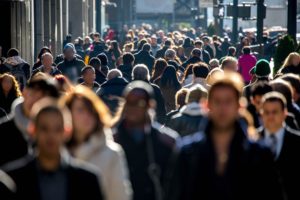Hunger is a feeling most of us only partially experience during the month of Ramadhan…
How Involved Do I Need To Be In My Community?
Involvement vs. Apathy
Citizenship in our communities and the responsibility we each have is a basic belief addressed in Islamic thought and practice and is supported by hadith as well as the Holy Qur’an. Actions are preferred over stagnation or indifference. Apathy, or a lack of interest, in particular, is a human trait which is discouraged and abhorred in Islam. It is, therefore, beneficial for the individual, in whatever capacity, to take an active role in the communities we live in.
The Holy Qur’an says,
“Everyone is guarded and protected on all sides by the order of God. God does not change the condition of a nation unless it changes what is in its heart. When God wants to punish a people, there is no way to escape from it and no one besides God will protect them from it. “(13:11)
We are very much responsible for making an effort to produce significant change and impact in our lives, both within and around us. Staying sedentary gets us nowhere. After all, one can never get from point A to point B by standing still. Change and progress can only come from action, and this is every individual’s responsibility to themselves as well as to our communities. Read our blog on How to Help Alleviate Hunger in our Community, for more on how to get involved.
Our Role as Muslims in North America
We, as Muslims, are very much a part of this country, where many of us were born or have chosen as our home. It is where we raise our children, work, and study. Therefore, not all of us in the Muslim community are immigrants. Many of us are first generation, second generation, and even native-born U.S. citizens whose families have been here for generations. We represent nearly every ethnic group and national origin, as Islam is not limited by race. Generally speaking, when an individual feels a sense of belonging, they are more likely to actively participate in the community where they live, because they feel their voice will be heard and respected. They are more willing to invest their time, because they want a community where their children feel welcomed and included. See our previous article, ‘Raising Youth to Contribute to the Community’.
Brotherhood/Sisterhood
Indifference and a lack of interest in the affairs of others is an issue that is clearly addressed in numerous hadith and in the Qur’an. During the last days of Hajj, which is obligatory for able believers, whilst pilgrims are collectively gathered in tents from every continent on Earth, problems, grievances, and current affairs are to be discussed and solutions and support encouraged. Ideally, this is to be continued upon return to the pilgrims’ everyday lives.
The Holy Prophet Muhammad (pbuh) said,
“A Muslim is the brother/sister of other Muslims. He/She never oppresses them. He/She never abandons them. He/She never leaves them alone in the face of calamities.”
Al-Mahajjah al-Bayda, vol. 3, pg. 332.
Here we see the inter-connectivity of humanity as an organic entity. When one individual is hurt the other hurts. Therefore, we have a responsibility to show concern for the needs and situations of others.
Another example of how citizenship is encouraged in Islam can be seen in Jum’ah, or Friday, prayers. This collective gathering of the community provides the ideal opportunity to meet, inquire after each other, and network. The speech that is given before prayers also includes one dedicated to the affairs of the community locally and at large. We are clearly not meant to be selfish, apathetic citizens concerned with only our own affairs. We are meant to participate actively and find ways to help support one another and elevate our greater communities.
The Holy Qur’an says, “Believers are each other’s brothers/sisters. Restore peace among your brothers/sisters. Have fear of God so that perhaps you will receive mercy.” (49:10)
Participation in the Community
Citizenship includes varying degrees of participation. Reaching out to relatives, to neighbors, or extending support or guidance for a troubled youth or immigrant family are all examples of being an active community member. One does not need to run for political office or attend town hall meetings to be an active citizen. It is important to note Ayatullah Sayyid al-Sistani’s position, that it is the duty of every citizen to abide by the laws of the country in which you reside. Therefore, within these guidelines and the parameters of the law, one can participate safely and confidently with the narrative and discourse of the community.
We as citizens must not remain silently secluded within the confines of our homes tending only to our affairs. Encouraging and actively supporting actions which are considered noble and just, (al-amr bi al-maroof), are duties in Islam. Action, in varying degrees, is an obligation, whether it be supporting just causes or discouraging ones which are unjust. Being proactive members of our community begins within the framework of our families, and extends outward to our co-workers, colleagues, neighbors, friends, local community centers, and so forth. Our sense of belonging and obligation to the laws of the land will encourage future and current generations to work for a unified goal of citizenship, which benefits us all as individuals and as a collective whole.
Related Posts
- How to Help Alleviate Hunger in Our Community
- Raising Youth to Contribute to the Community
In order for our children and youth to fully contribute to society, it is crucial…
- Sayyid Kashmiri Visits the Iowa Community - October 14-16, 2016
Sayyid M.B. Kashmiri visits the Iowa community, delivering a lecture series on the universal and…


Leave a Comment:
You must be logged in to post a comment.